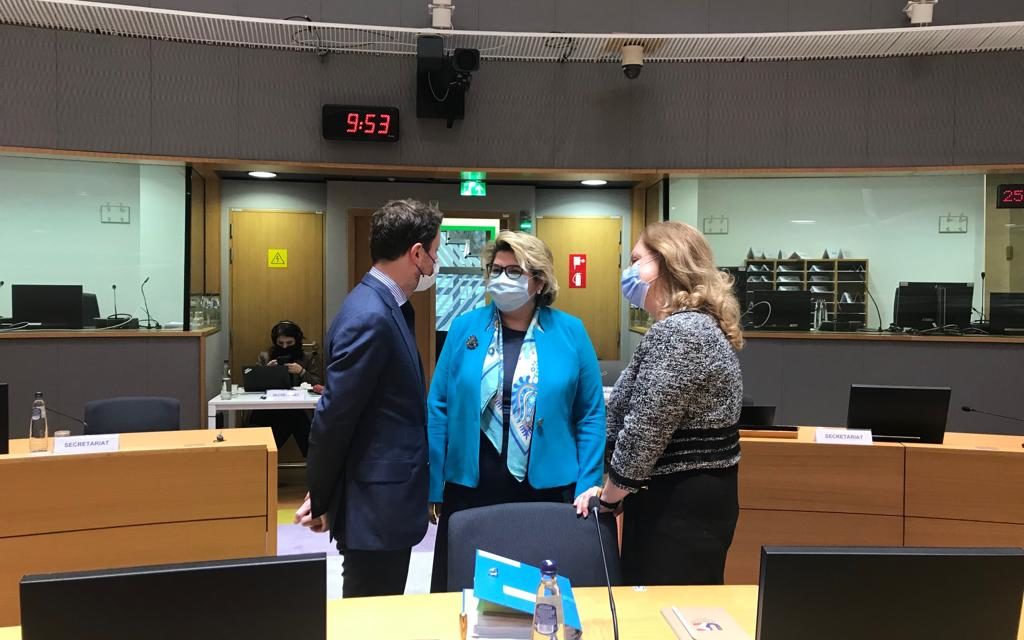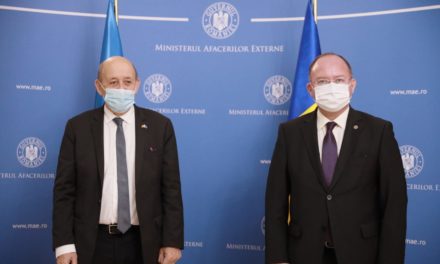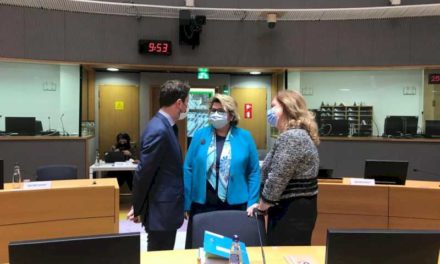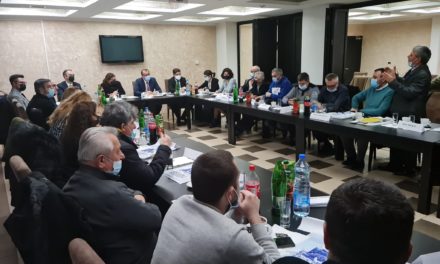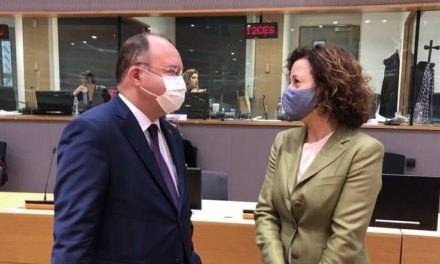Ministrul afacerilor externe Bogdan Aurescu a deschis la 5 aprilie, la Berlin, alături de Annalena Baerbock, ministrul de externe al Germaniei – țară care deține Președinția G7, și de Jean-Yves Le Drian, ministrul de externe al Franței – stat care asigură Președinția Consiliului Uniunii Europene, Conferința internațională de sprijin pentru Republica Moldova (Moldova Support Conference).
Inițiativa României, Germaniei și Franței urmărește generarea de asistență imediată politică, financiară și materială, precum și expertiză pentru procesul de reformă democratică, din partea instituțiilor și statelor membre ale Uniunii Europene, a țărilor G7, a instituțiilor financiare și organizațiilor internaționale, precum și a altor parteneri de dezvoltare. Evenimentul beneficiază de participarea Prim-ministrului Republicii Moldova, Natalia Gavrilița, precum și a ministrului afacerilor externe și integrării europene de la Chișinău, Nicolae Popescu.
În cadrul intervenției susținute în deschiderea conferinței, ministrul afacerilor externe Bogdan Aurescu a anunțat faptul că Guvernul României pregătește un pachet suplimentar de asistență financiară nerambursabilă în beneficiul Republicii Moldova, în valoare de 10 milioane de euro. Decizia este luată într-o perioadă în care sprijinul pentru Republica Moldova este deosebit de necesar și reconfirmă implicarea constantă și fermă a României în asigurarea stabilității și dezvoltării Republicii Moldova.
Totodată, șeful diplomației române a punctat asistența nerambursabilă în valoare de 100 de milioane euro care urmează să fie implementată prin proiecte de dezvoltare, în baza Acordului semnat de către Prim-miniștrii Nicolae Ciucă și Natalia Gavrilița în cadrul Ședinței comune a Guvernelor României și Republicii Moldova (Chișinău, 11 februarie 2022).
Ministrul Bogdan Aurescu a evocat, de asemenea, acordarea de către România, în contextul actualei crize, a unei asistențe în valoare totală de 3,8 milioane de euro, care constă în 5000 tone de păcură pentru sprijinirea securității energetice a Republicii Moldova și în importante cantități de carburanți. A menționat transporturile umanitare, care au fost realizate, cu materiale de primă necesitate, pentru a fi puse la dispoziția refugiaților. De asemenea, a punctat organizarea de coridoare verzi pentru preluarea directă în România, pe cale rutieră și feroviară, de refugiați ucraineni din Republica Moldova, cu scopul de a sprijini persoanele afectate de războiul din Ucraina, precum și de a prelua din presiunea cu care se confruntă sectorul public și cel neguvernamental din Republica Moldova.
Ministrul Bogdan Aurescu a exprimat convingerea că Platforma de sprijin pentru Republica Moldova va facilita adaptarea asistenței internaționale la nevoile concrete ale autorităților de la Chișinău, precum și mobilizarea unui sprijin robust și coordonat, atât în actualul context, cât și pe termen mediu, printr-un angajament de durată dincolo de actuala criză declanșată de agresiunea Federației Ruse împotriva Ucrainei.
În context, a anunțat că România va găzdui, la București, cea de-a doua conferință ministerială a Platformei de sprijin pentru Republica Moldova.
Ministrul român al afacerilor externe a exprimat aprecierea României pentru eforturile ample depuse de autoritățile Republicii Moldova, de cetățeni și organizații nonguvernamentale, pentru primirea și îngrijirea unui număr impresionant de refugiați din Ucraina.
De asemenea, ministrul Bogdan Aurescu a pledat pentru mobilizarea din partea comunității internaționale de asistență financiară robustă care să permită autorităților de la Chișinău să gestioneze criza energetică, să stabilizeze finanțele publice și să sprijine obiectivele de reformă ale actualului Guvern, precum consolidarea statului de drept, modernizarea instituțiilor publice și ridicarea nivelului de trai al populației.
Totodată, șeful diplomației române a susținut imperativul sprijinirii Republicii Moldova în construirea securității energetice, îndeosebi prin extinderea rețelei de interconectare electrică între Republica Moldova și UE, prin România, extinderea rețelei de interconectare în domeniul gazelor naturale în interiorul Republicii Moldova și diversificarea aprovizionării cu gaze naturale.
A subliniat poziția României conform căreia este necesară recunoașterea perspectivei europene clare pentru Republica Moldova. În context, a subliniat propunerea de constituire a unui Grup de sprijin pentru Republica Moldova la nivelul Comisiei Europene cu rolul de a contribui la o mai bună coordonare și articulare a sprijinului pentru Republica Moldova.
Transmitem mai jos transcrierea declarațiilor ministrului afacerilor externe Bogdan Aurescu în deschiderea Conferinței internaționale de sprijin pentru Republica Moldova (Moldova Support Conference):
Intervenția ministrului Bogdan Aurescu în format video poate fi urmărită la: http://www.mae.ro/node/58318.
Thank you so much, Minister Baerbock, dear Annalena, for graciously hosting this conference here at the Federal Foreign Office!
At today’s landmark conference, together with you and Minister Le Drian, cher Jean-Yves, I am honoured to co-sponsor the initiative of launching the Moldova Support Platform.
Dear Prime-minister Gavrilița,
From the outset, allow me to convey Romania’s profound appreciation for the Republic of Moldova’s impressive efforts in welcoming and hosting Ukrainian refugees forced to flee their homes. Let me pay tribute to the authorities, to the citizens and organisations in the Republic of Moldova who have shown tremendous solidarity, generosity and humanity.
Distinguished colleagues,
Russia’s invasion of Ukraine has profoundly changed the reality in the region.
And the Republic of Moldova, as Ukraine’s direct and most affected neighbor, is at a critical juncture and needs our support. Our consistent and immediate support. As we have gathered here at this conference, we are sending a powerful message of unwavering support for and engagement with Chișinău.
And I am glad, dear Annalena, that you share my view, as we discussed just before the start of this conference, that supporting the Republic of Moldova goes beyond supporting Chișinău itself, but it means supporting the security of the region and of Europe in a larger sense.
The Moldova Support Platform will allow us to adapt our assistance to the Republic of Moldova’s precise needs, as well as to mobilize robust and co-ordinated support. And this is a strategic and enduring choice that we are making.
It is strategic because the financing gap and the overlapping crises that the Republic of Moldova is facing threaten the Government’s ability to continue the implementation of the reforms it has so strongly committed to. Moreover, these challenges could have political implications for the pro-European and pro-reform Government in Chișinău.
It is enduring because we are here for the long haul. This conference is not just a one-off event, to deal with the current crisis, as severe and unexpected that may be. We are here as all-weather friends of the Republic of Moldova, we are here because we want it to succeed in its courageous journey – towards a democratic, free and fair society that will be part, I am convinced, of the European family, in not too distant future.
Ladies and gentlemen,
Since autumn last year, the state budget of the Republic of Moldova has been under severe strain. Last autumn, we have witnessed a gas crisis which was an example of how energy can be used for political purposes. After that, a new gas contract was in place, bringing about some predictability, but a costly one – the rising prices and the volatility on the international markets have drained heavily Republic of Moldova’s state coffers.
On top of that, the Republic of Moldova is now confronted with a refugee crisis – which is unprecedented in recent times, and with the harsh economic fallout of the war in Ukraine. Hundreds of people fleeing the Russian aggression have entered the country, and about 100,000 are still in the country. The Government in Chișinău has to bear additional costs of more than 1 million EUR/day.
And realistically, current exceptional challenges are beyond the Republic of Moldova’s institutional capacity to address them while at the same time focusing on implementing the needed reforms – the main objective of the government.
In this context, I warmly welcome yesterday’s decision in ECOFIN, approving the 150 million EUR macro-financial assistance for the Republic of Moldova.
And let me stress here a couple of other important steps taken over the past weeks: the synchronization of Ukraine and the Republic of Moldova with Continental Europe power grids, which needs to be consolidated, from a technical point of view; the status agreement allowing Frontex to rapidly assist the Republic of Moldova in border management.
From a humanitarian standpoint, EU and international support has been swift. However, more needs to be done, including by relocating refugees from the country.
More swift, decisive and coordinated support is needed. That’s why we are here today united and determined to move to another stage our support for the Republic of Moldova.
Looking around the table to all of us gathered here makes me optimistic. And I strongly believe that the initiative launched today here in Berlin will be a powerful and lasting platform. It will help address both pressing challenges, but also Chișinău’s medium and long-term development needs.
Bilaterally, Romania is providing the Republic of Moldova with a substantial support package of grants that comprises: 100 million EUR as project-based grants; this new package was agreed at our joint Government Meeting in Chisinau in February; and we are ready to receive from our partners in Chisinau proposals for development projects which we will soon start to implement; various donations in kind, more than 70 tons, to help relieve the stress of accommodating the refugees and bolster the energy security of the country; on this last point, I mention the donation of fuel worth of 3,8 million EUR.
At the same time, I am pleased to announce that Romania decided to grant fresh money to support the budget of the Republic of Moldova at these critical times – a grant of 10 million EUR.
We will continue delivering substantial in-kind humanitarian assistance for the refugees in Moldova. Likewise, Romania has set up “green lanes” to fast-track daily transfer of people fleeing Ukraine through the Republic of Moldova directly into Romania. And the aim is to help refugees while avoiding putting more pressure on an already overstretched infrastructure in your country.
Let me share with you some of Romania’s thoughts on several key priorities that we need to focus on the longer term, in support of the Government in Chișinău. These are actually conclusions we have reached together with our friends in Chișinău during the intense bilateral dialogue we had over the past month.
First, a robust financial assistance is essential, to help the authorities cope with the energy crisis, stabilize public finances and support the current Government’s objectives to implement reforms, strengthen the rule of law, modernize public institutions and sustain the standard of living.
Second, on energy security, there is a wide agenda in front of us. We should look to developing local energy generating capacities, strengthening electricity interconnections, as well as of gas connectivity inside the Republic of Moldova and to support gas supply diversification with a view to reducing its dependency on Russian gas. We are, as you know, working together, looking for alternative supply options, such as Azerbaijan. We will also host in our own storage capacities gas belonging to the Republic of Moldova. And we are considering to build a Moldovan gas storage capacity on the Romanian territory. In any scenario, the recently finalized Iasi-Chișinău gas pipeline will play a central role.
Third, in order to bolster and advance the reform agenda, I propose a very simple and effective solution, to set-up a Moldova Support Group within the European Commission, that would bring together staff from different policy areas, which is mirroring – in structure, not in size – the similar Group on Ukraine which was already created. EU and EU Member States overall assistance for the Republic of Moldova is important, so we would have an aggregate effort to support achieving the long-term objectives of Chișinău.
Romania believes that it is also high time for a clear recognition and advancement of the Republic of Moldova’s European perspective. Not just because of the current exceptional circumstances, but also because of the clear commitment and strong, consistent reform drive of the Government in Chisinau, which is not circumstantial, but rooted down in Chisinau’s firm political will and in the solid popular support for the European choice within the Republic of Moldova.
We know from our own experience that this is a first step of a long process. But we know, also from our own experience, that we need to take this step now if we really want to maintain credibility, prove once more the transformative power of the European project is working and, at the end of the day, to give this reform-minded Government the chance it deserves.
Finally, allow me to announce Romania’s intention to co-host in Bucharest the next ministerial conference of the Moldova Support Platform.
The Platform has taken shape today here in Berlin. And I think it is up to all of us to make the most of it!
Thank you!

